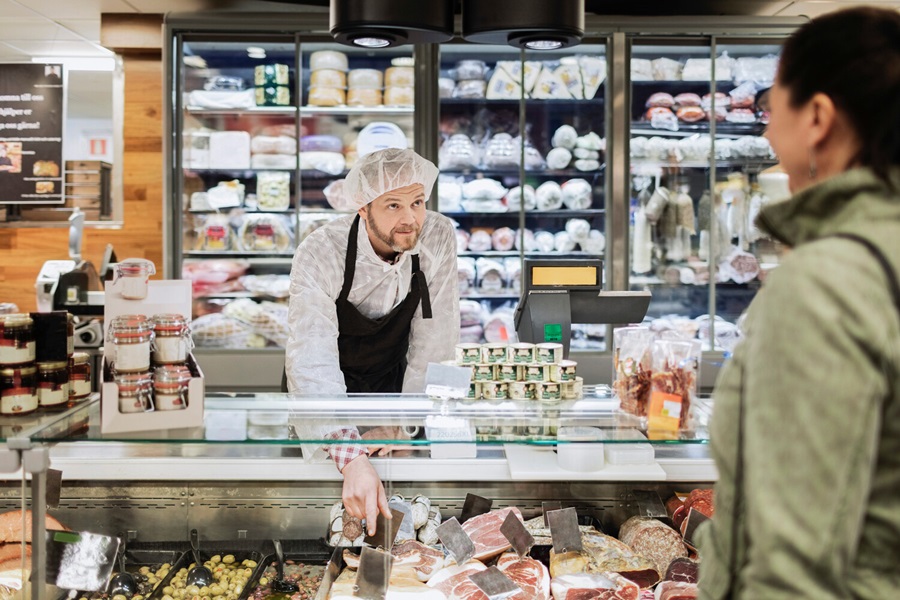With food inflation reaching a record level of 12.8% on average over 2023, French consumers tightened their belts until October when it came to purchasing FMCG. In total, volume was down 3.2% compared with 2022. However, the decline slowed towards the end of the year, and volume even grew by 0.5% in December as households treated themselves during the holiday period – albeit within reason.
Putting the figures into perspective, we see that 2023 closed with an increase of 0.5% in FMCG volume compared to 2019, before the pandemic. This growth clearly shows the resilience of the market. Meanwhile, annual spend per household increased by 8.2% on average – the highest rise in 40 years.
Coping with ongoing crisis
Within the context of factors such as inflation, social inequalities, global warming, and geopolitical tensions, French consumers have changed their purchasing and consumption habits to manage their budgets.
They continued to do their grocery shopping more often – making two more trips to the store each month – to spread out their spending. While they put fewer items in their shopping basket (-1.9%) and opted for smaller packages (+1.3%), the cost was 6% higher.
To alleviate the impact of rising prices, households have had to make choices: reduce the quantities purchased, buy different brands, or move towards different channels or retailers.
Households opt to buy less
The first choice for most shoppers was to reduce their purchases, and this explains almost three quarters of their decisions. They did this through:
- Reducing food waste
- Consuming fewer categories at breakfast
- Focusing on the main course at lunch
- Sometimes skipping cheese or dessert.
This decrease has had a greater impact on products with a high face value, as well as non-food categories such as cleaning products (-6%) and beauty segments including make-up, shower products, and shaving products (-7%).
Some French households have had to make sacrifices and skip meals altogether. The share of vulnerable households increased from 35% of the population in 2020 to 41% in 2023.
Although the decrease in purchases of traditional fresh products has slowed, it is still noticeable (-2%), and a large majority of categories are trending downward. Citrus fruits, which saw their prices soar, have recorded an 8.3% drop in volume, while potatoes, also affected by the price rise, are doing quite well with an increase of 1%. The same goes for cheap protein products, such as chicken, with a 5.5% rise in consumption. The total traditional fresh market recorded a value growth of 3%.
A move downmarket
Alongside the decrease in quantity, consumers are trading down in the products they buy; a trend which represents 16% of their decisions. They are turning to private labels, which continue to gain share of spend and are increasingly popular. Private labels still have potential to grow in France, with a low market share compared to other European countries.
The move downmarket also involves fewer purchases of so-called food transition products, including organic products which have experienced a 15% drop.
Inflation tends to impede good intentions to eat more healthily, but French consumers remain attentive to what they eat. Despite remote working and more meals being prepared at home, purchases of ready-to-eat meals have fallen by 2.8 %, while the share of homemade meals has started to rise again (+0.3%).
Environmental concerns are growing, and the number of Eco-Engaged households is increasing. They choose more ecological products and take actions to reduce waste. The households most committed to responsible consumption (Eco-Conscious) have drastically reduced their purchases by 12.5%, and their spending by 3.5%, despite inflation.
Adapting habits to the context
French households are shifting to new stores, shopping around, and going for the best price deals. In 2023 they favoured independent retailers, to the detriment of chains.
Retailers launched fewer promotions in 2023. Spend on promotion only reached 14.5% of expenditure across total FMCG and self-service fresh food, down 0.4% year-on-year. However, this clearly remains a popular lever in the face of inflation, with 79% (+5%) of consumers saying “I buy products on offer as often as possible”.
To find out more about the French FMCG industry, reach out to our experts.

